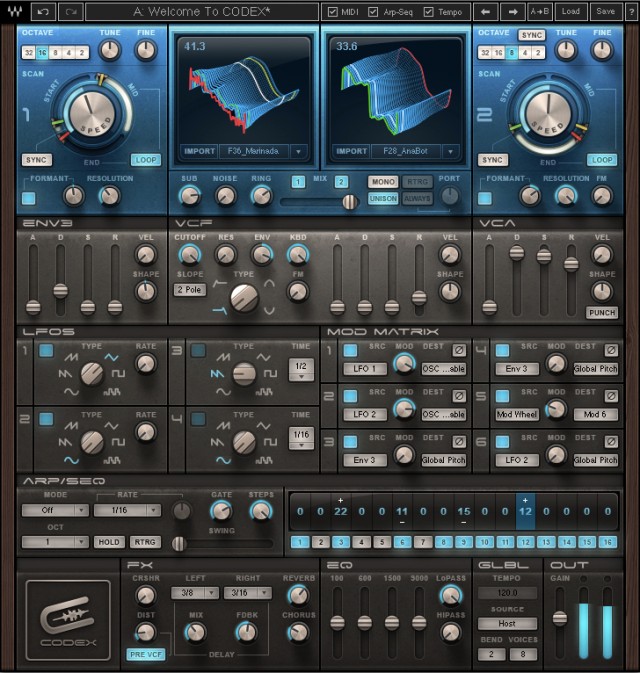
Waves today introduced Codex, a new wavetable synthesizer instrument for Mac & Windows.
Waves Codex is a polyphonic synthesizer, based on a granular wavetable engine. According to Waves, Codex is designed to ‘create sounds that range from warm acoustic and analog emulations to completely new, never-before-heard intricate and evolving textures’.
Here’s the official video intro:
Features:
- Polyphonic wavetable synthesizer.
- Oscillators with progressive wavetable scanning capabilities.
- Advanced and comprehensive Modulation Matrix.
- Formant control – direct control over the acoustic resonance of the sound.
- Wavetable (sample) importing.
- User-replaceable wavetables.
- Arpeggiator/16-step sequencer.
- Integrated chorus, delay, reverb, distortion and bit crusher effects.
- Visual dynamic waveforms.
- Plugin and standalone instrument.
Here’s a Codex demo, with producer/engineer and Codex developer Yoad Nevo:
Here’s an in-depth look at the various sections of Codex, with special focus on the synth’s oscillators and modulation capabilities:
Codex is available now; it’s priced at US $200, but it has an introductory price of $99.
If you’ve used Codex, let us know what you think of it!

Looks ok and would be cool if SERUM didn’t exist, but I’m sticking with SERUM which has a much better interface
Compared to Serum, Waves’ offering is quite hilarious.
What’s are the pros of Serum over Codex?
Serum is more expensive and I’ve never heard of the company that makes it (Xfer Records).
Xfer Records is a collaboration between Deadmau5 and Steve Duda.
Serum is actually cheaper without the half price sale, and not much more than the half price cost! Steve Duda is a well respected developer (and musician).
Serum has been a massive hit (check KVR and GearSlutz) due to being able to draw multipoint LFO’s (and ADSR etc.) and drag and drop them to modulate just about anything. It is super fast workflow….The ability to program wavetables (from formulas if you want) or draw them. import them and mash them up with some impressive processing tools seems to be vastly superior as well from what I can see. Try them both- Serum has a very good fully working 20 minute demo, most people seem to be buying it after using it…including me!
Codex is currently cheaper ($99, Serum is $129), once both their intro pricing has run out, Serum will be cheaper ($189 vs $200). So they’re basically priced the same.
While both are wavetable synths with two oscillators and four LFOs, Serum is a power tool with all the excellent stuff we come to expect after LFOTool, Cthulu, and especially Nerve (Xfer’s previous products).
Codex seems to aim at being easy and ending up simple. Serum might look more complex on the face of it, but only in direct comparison. If you’ve ever worked with something like Massive, FM8, Kontakt, or any of the current crop of synths/plugins with a reasonably comprehensive feature set, it’s easy to get your head around.
What I mostly find hilarious about the two is that big ol’ Waves couldn’t come up with something better than this, while Duda’s one man show once again delivers an excellent product that looks and sounds like a proper contender to products already doing non-standard kinds of synthesis (like Iris, whatever FL Studio’s thing is called, Nave on the iPad etc.) In that regard, Codex looks like a rushed me-too-product.
Feel free to call me out as an Xfer fanboy – you’d be right – but I have yet to see anything from Codex that would warrant the price tag or the Waves name on the tin.
Yeah, I meant LFOs/envelopes… you know..
What if Codex SOUNDS better?
What If…
https://www.youtube.com/watch?v=2n5qhxx5Iyg
It’d better
Serum is AWESOME. Bought it the day after it came out and it’s been nothing short of a amazing.
This looks cool but I fear it’s just a case of too-little-too-late by Waves. And it’s not as feature-rich as Serum.
you buy things?
suspicious timing or
just really shitty timing.
Use this link and receive a COUPON CODE for an additional 10% OFF!
http://refer.waves.com/bi5lS
Fire up the World Engine, I need this Codex!
Serum. Nuff Said lol! But seriously though will save majority of my comments till there is a good comparison vidja! I think some of it may boil down to how clean one or the other may sound. I already know serum can do -150 dB on a sawtooth played at 1 Khz at 44100. That right there is pretty awesome and the fact that serum is so clean that there are virtually no artifacts/unwanted harmonics in comparison to most any other vst synth out there. I also like the fact that serum gives you that perfect clean slate and leaves it up to you to add the harmonics. We shall see. Thinking serum is going to be the new king though. Sure seems to be worthy of that statement in my opinion.
Guess I’m already a serum fanboy haha.